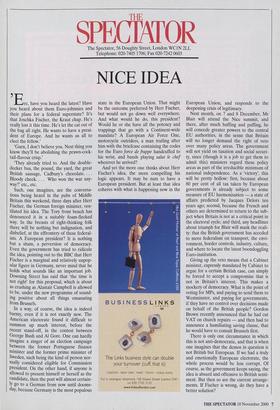The Spectator, 56 Doughty Street, London WC1N 2LL Telephone: 020-7405
1706; Fax 020-7242 0603
NICE IDEA
Ere, have you heard the latest? Have you heard about them Euro-johnnies and their plans for a federal superstate? It's that Joschka Fischer, the Kraut chap. He's really lost it this time. He's let the cat out of the bag all right. He wants to have a presi- dent of Europe. And he wants us all to elect the fellow.'
`Gun, I don't believe you. Next thing you know they'll be abolishing the prawn-cock- tail-flavour crisp.'
`They already tried to. And the double- decker bus, the pound, the yard, the great British sausage, Cadbury's chocolate. . . Bloody cheek. . . . Who won the war any- way?' etc., etc.
Such, one imagines, are the conversa- tions being heard in the pubs of Middle Britain this weekend, three days after Herr Fischer, the German foreign minister, ven- tilated his idea. The Tory front bench has denounced it in a suitably foam-flecked way. In the breasts of right-thinking folk there will be nothing but indignation, and disbelief, at the effrontery of these federal- ists. A European president? It is nothing but a sham, a perversion of democracy. Even the government has tried to ridicule the idea, pointing out to the BBC that Herr Fischer is a marginal and relatively unpop- ular figure in Germany, never mind that he holds what sounds like an important job. Downing Street has said that 'the time is not right' for this proposal, which is about as crushing as Alastair Campbell is allowed to be, under the new programme of sound- ing positive about all things emanating from Brussels.
In a way, of course, the idea is indeed barmy, even if it is not exactly new. The American electorate found it difficult to summon up much interest, before the recent stand-off, in the contest between George Bush and Al Gore. One can hardly imagine a zinger of an election campaign between the former Portuguese finance minister and the former prime minister of Sweden, such being the kind of person nor- mally considered eligible for Commission president. On the other hand, if anyone is allowed to present himself or herself as the candidate, then the post will almost certain- ly go to a German from now until dooms- day, because Germany is the most populous state in the European Union. That might be the outcome preferred by Herr Fischer, but would not go down well everywhere. And what would he do, this president? Would be or she have all the potency and trappings that go with a Continent-wide mandate? A European Air Force One, motorcycle outriders, a man trailing after him with the briefcase containing the codes for the Euro force de frappe handcuffed to his wrist, and bands playing salut le chef wherever he arrived?
And yet the more one thinks about Herr Fischer's idea, the more compelling his logic appears. It may be nuts to have a European president. But at least that idea coheres with what is happening now in the European Union, and responds to the deepening crisis of legitimacy.
Next month, on 7 and 8 December, Mr Blair will attend the Nice summit, and there, after much huffing and puffing, he will concede greater powers to the central EU authorities, in the sense that Britain will no longer demand the right of veto over many policy areas. The government will not yield on taxation and social securi- ty, since (though it is a job to get them to admit this) ministers regard these policy areas as part of the irreducible minimum of national independence. As a 'victory', this will be pretty hollow: first, because about 80 per cent of all tax taken by European governments is already subject to some measure of EU harmonisation — a state of affairs predicted by Jacques Delors ten years ago; second, because the French and others are determined to return to the sub- ject when Britain is not at a critical point in the electoral cycle; and third, any headlines about triumph for Blair will mask the reali- ty: that the British government has acceded to more federalism on transport, the envi- ronment, border controls, industry, culture, and where to locate the latest boondoggling Euro-institution.
Giving up the veto means that a Cabinet minister, expressly mandated by Cabinet to argue for a certain British case, can simply be forced to accept a compromise that is not in Britain's interest. This makes a mockery of democracy. What is the point of voting for MPs, and paying to send them to Westminster, and paying for governments, if they have no control over decisions made on behalf of the British people? Gordon Brown recently announced that he had cut VAT on church repairs — and then had to announce a humiliating saving clause, that he would have to consult Brussels first.
There is only one circumstance in which this is not anti-democratic, and that is when one imagines that the demos in question is not British but European. If we had a truly and emotionally European electorate, the whole process would be less corrupt. Of course, as the government keeps saying, the idea is absurd and offensive to British senti- ment. But then so are the current arrange- ments. If Fischer is wrong, do they have a better solution?


































































































 Previous page
Previous page